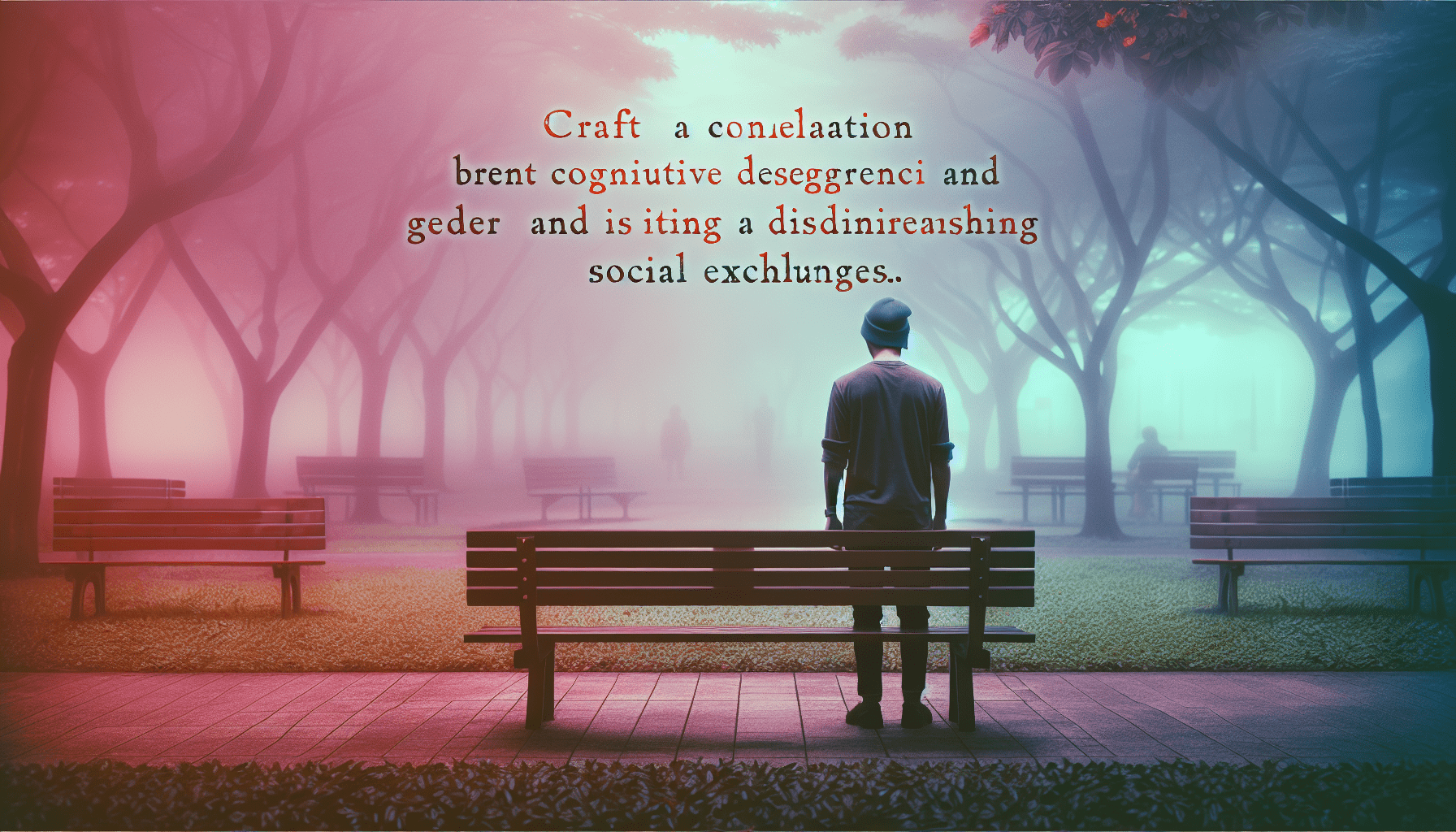Have you ever wondered how closely linked our mental faculties are to our social interactions? It turns out that the mind and social engagement are intricately connected. The fascinating intersection of cognitive decline and social withdrawal sheds light on how changes in mental acuity can influence our social lives and vice versa. This topic is not only compelling but also crucial to our understanding of mental health and aging.
Understanding Cognitive Decline
To grasp the link between cognitive decline and social withdrawal, we first need a firm understanding of what cognitive decline entails. This term refers to the gradual loss of brain functions related to thinking, remembering, and reasoning. While it can occur at any age, it's more commonly associated with aging. Cognitive decline may start with subtle changes in memory but can progress to interfere significantly with daily life.
Key Characteristics of Cognitive Decline
Cognitive decline is characterized by various symptoms and manifestations. Some common indicators include:
- Memory Problems: Forgetting things more frequently or having difficulty recalling information.
- Attention and Concentration Issues: Experiencing trouble focusing on tasks or following conversations.
- Difficulty with Routine Tasks: Struggling to complete familiar activities or manage a schedule.
- Language Difficulties: Finding it hard to follow or engage in conversations.
As these symptoms progress, they can lead to more severe disorders like dementia.
Causes of Cognitive Decline
Numerous factors contribute to cognitive decline. Genetics can play a role, but lifestyle habits and medical conditions, such as cardiovascular disease or diabetes, also have significant impacts. Poor sleep, chronic stress, and inadequate mental stimulation are other contributing factors.
The Nature of Social Withdrawal
Social withdrawal is the process by which individuals retreat from engaging with others and disengage from social activities. This can manifest in reduced interactions with friends and family, a lack of participation in social events, or avoiding new social situations altogether.
Signs of Social Withdrawal
Recognizing social withdrawal involves observing behavioral changes that reflect a pull away from social interaction. These signs include:
- Loss of Interest: No longer seeking interactions that were once enjoyable.
- Isolation: Spending excessive amounts of time alone.
- Avoidance: Making excuses to not attend social gatherings.
Such withdrawal can lead to feelings of loneliness and depression, impacting overall quality of life.
Causes of Social Withdrawal
Several factors can precipitate social withdrawal. Emotional states such as depression, anxiety, or low self-esteem often contribute. Additionally, significant life changes (like moving or losing a loved one), health issues, or a decline in mobility can also lead to social withdrawal.
Interconnection Between Cognitive Decline and Social Withdrawal
The relationship between cognitive decline and social withdrawal is complex and bidirectional. Cognitive decline can lead to social withdrawal, while prolonged social isolation can exacerbate cognitive deterioration.
How Cognitive Decline Leads to Social Withdrawal
Cognitive decline can make social interactions challenging and exhausting. Imagine struggling to remember names or keep up with conversations; this can lead to embarrassment or frustration, prompting one to avoid social settings. Moreover, cognitive deficits can make interpreting social cues difficult, creating a barrier to meaningful connections.
Consider these pathways through which cognitive decline might lead to reduced social engagement:
- Communication Barriers: Language and memory issues can make conversations uncomfortable.
- Decreased Confidence: Difficulty with cognitive tasks might undermine self-assurance in social interactions.
- Depression and Anxiety: Feelings of inadequacy can lead to mental health issues that discourage social participation.
Impact of Social Withdrawal on Cognitive Health
Social engagement plays a crucial role in maintaining cognitive health. Interacting with others stimulates the brain, fostering mental agility and resilience. Hence, reduced social interaction can lead to a decline in cognitive abilities.
Here's how social withdrawal impacts cognitive health:
- Reduced Mental Stimulation: Social interactions challenge the brain, offering mental exercise necessary for cognitive sharpness.
- Increased Loneliness and Depression: Isolation can lead to mental health problems that, in turn, impair cognitive function.
- Lack of Emotional Support: Social networks provide emotional support, aiding in stress management, which is vital for brain health.

The Role of Social Engagement in Cognitive Health
Given the potential negative cycle between cognitive decline and social withdrawal, fostering social engagement is incredibly valuable for cognitive health, particularly in aging populations.
Benefits of Social Interaction
Engaging with others offers numerous cognitive benefits, such as:
- Enhanced Memory Function: Conversations encourage the brain to recall names, events, and facts.
- Improved Problem-Solving Skills: Social activities often require quick thinking and adaptability.
- Stress Reduction: Social support mitigates the effects of stress on the brain.
Strategies for Promoting Social Engagement
To combat the risks posed by social withdrawal, especially in individuals experiencing cognitive decline, it's crucial to cultivate a socially rich environment. Here are several strategies:
- Regular Social Events: Encourage participation in community activities, clubs, or classes.
- Technology Use: Leverage digital tools and social media to connect with others, especially if mobility is a concern.
- Family Involvement: Foster regular family interactions and visitations.
- Volunteer Opportunities: Engaging in community service or volunteer work can provide a sense of purpose and connection.

Supporting Individuals Experiencing Cognitive Decline and Social Withdrawal
Understanding the intertwined nature of cognitive decline and social withdrawal impels us to explore effective support systems. These systems should focus on both mitigating cognitive decline and fostering social engagement.
Practical Tips for Caregivers and Families
For those providing care or support, here are some actionable steps:
- Encourage Routine Social Activities: Establish a weekly calendar of activities that involve social interaction.
- Monitor Mental Health: Be vigilant about signs of depression or anxiety and seek professional help if needed.
- Foster a Positive Environment: Create a supportive and encouraging space for open communication.
Importance of Professional Help
In some cases, professional intervention may be necessary. Cognitive therapists and social workers can offer strategies and guidance tailored to individual needs. Seek support if there's a noticeable decline in cognitive abilities or significant social withdrawal.

Conclusion: Strengthening the Cognitive-Social Bond
The dynamic relationship between cognitive decline and social withdrawal highlights the importance of nurturing both mental acuity and social bonds. As you consider this connection, think about ways to support yourself and loved ones in maintaining healthy cognitive and social lives. This understanding not only equips us to support aging populations better but also attunes us to the interconnectedness of our mental and social well-being. Through proactive measures and supportive environments, we can mitigate the effects of cognitive decline, promote social engagement, and improve quality of life for those affected.


